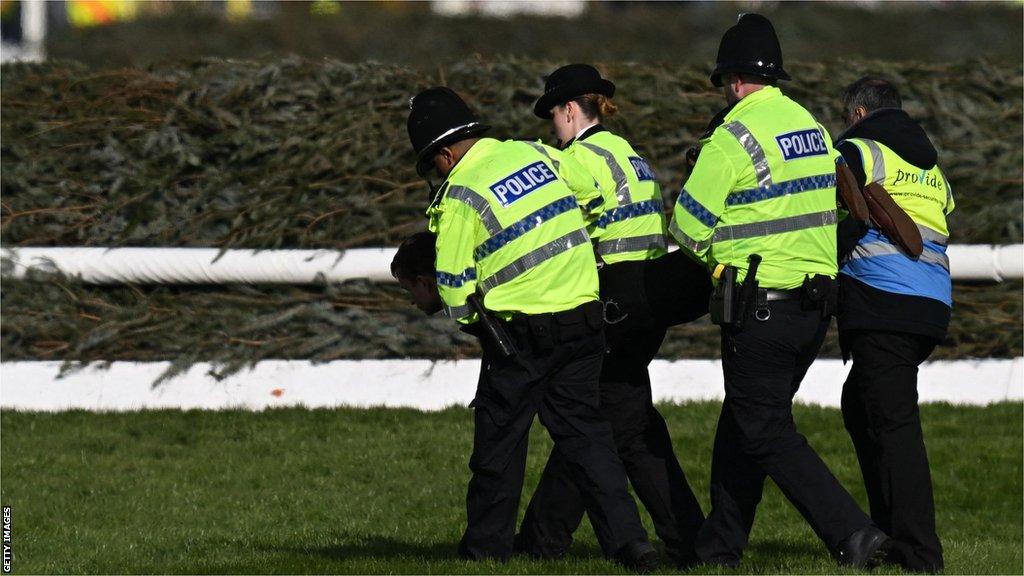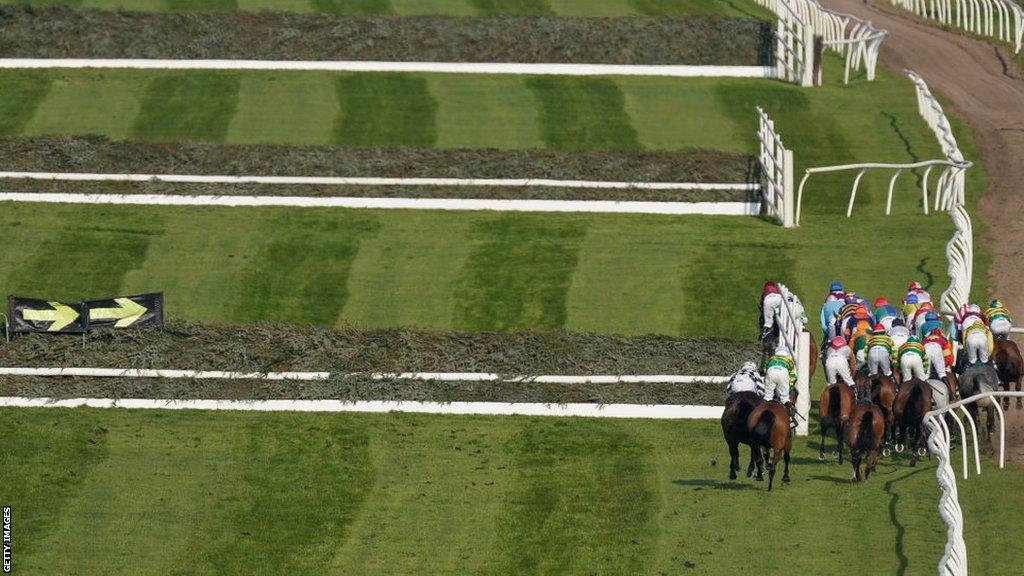Grand National 2023: What happened at Aintree and the fallout from it
- Published

Police arrested 118 people over disruption to the Grand National
The 175th running of the Grand National at Aintree in Liverpool delivered more than its usual drama.
Protests, arrests, and the deaths of three horses across the three-day meeting have sparked debate over animal welfare and possible reforms to British jump racing.
What happened?
The start of the Grand National was delayed by 14 minutes after animal rights activists entered the track, demonstrating against the staging of the race which was later won by Corach Rambler.
Police said they arrested 118 people over Saturday's disruption, which saw nine people enter the course.
Hill Sixteen died after falling at the first fence of the race, with just 17 of the 39 runners completing Saturday's race which features 30 fences and just over four miles in length.
The horse's trainer Sandy Thomson blamed "ignorant" protesters for the death of Hill Sixteen, adding the delay "unsettled" everyone.
"It was all caused by these so-called animal lovers who are actually ignorant and have absolutely no idea about the welfare of horses," Thomson told BBC Radio 4's Today programme.
The British Horseracing Authority "robustly condemned" the protests, adding it would analyse the races to understand what caused three horse fatalities.
What do protesters want to see?
Animal Rising's Ben Newman says the public doesn't blame protesters for the death of Hill Sixteen
Climate and animal rights group Animal Rising, who demonstrated outside Aintree, said on social media their actions "aimed to prevent" the death of horses.
"The real reason the horse was running the race was so that people could bet on the horse, the jockeys could make money and so people could have a fun day out, and that doesn't seem like a good enough reason to put an animal in harm's way," Ben Newman, a spokesperson for Animal Rising told BBC Radio 5 Live.
"We disrupted the race for two reasons. One was to stop the race to stop a horse dying. Two, to have a conversation about our broken relationship back to animals."
Animal rights charity Peta UK said the Grand National is one of the "most hazardous" races in the world and called on the public to urge sponsors to withdraw financial support for the event.
Campaign group Animal Aid said jump racing should be banned, adding: "Another innocent horse has their life taken from them in the name of entertainment and gambling."
Meanwhile the Royal Society for the Prevention of Cruelty to Animals (RSPCA), which has regular dialogue with the horse racing industry, has called for reform into the size of the Grand National field and the use of whips in British racing.
"One of the things we see at the Grand National is a big field, so lots of horses running together. That causes issues when horses fall and get in the way of other horses and cause accidents in that way," said Emma Slawinski, director of policy, prevention and campaigns at the RSPCA.
"The other thing we think needs to change very urgently is to see an end to the use of the whip for encouragement, hitting the horses to make them run faster."
What does British racing say?
The British Horseracing Authority (BHA) says that racing is safer than ever.
"As a sport we have for years shown great determination and commitment to improve welfare standards by taking measured scientific, evidence-based, regulatory and education-based steps," the BHA said.
"It is for this reason that the fatal injury rate in the sport has reduced by over one-third in the last 20 years, to 0.2% of runners.
The governing body condemned the "reckless and potentially harmful actions" of the animal rights activists who entered the track, but said it would "do nothing to diminish its huge and enduring international appeal".
It said Saturday's race was watched by more than 500 million people worldwide.
That popularity ensures the sport makes a positive impact on the UK economy too, with horse racing contributing £4.1bn annually to it, according to BHA figures.
Following Envoye Special's fatal injury on day one of the Grand National meeting, the BHA said: "Racing, like all sport, carries an element of risk.
"By being bred for racing the 20,000 thoroughbred horses who compete each year in Britain are provided with a quality of life which is almost unparalleled."
What measures have already been taken?

Horses in the 2023 Grand National bypassed a fence on their second circuit after Hill Sixteen died during the race
There have been five fatalities from 395 runners in the 10 Grand Nationals raced since changes were introduced in 2012 following a safety review.
The changes included moving the start 90 yards closer to the first fence to help slow the speed the horses arrive at it. The start has also been moved further away from the crowd to reduce noise that can distract the horses.
Some of the fences were also redesigned, with a reduction of between four and five inches to the drop on the landing of Becher's Brook among the changes.
Changes to the fences' core material were also introduced, with a plastic centre replacing the wooden stakes which traditionally supported the structure of the fences to make them more flexible and less likely to cause dangerous falls when hit by horses.
Earlier this year, changes were made to rules on the use of whips in British racing which reduced the number of times the whip is permitted by one - to seven in jumps races and six in flat races, with jockeys facing suspension for going above that limit and their horse being disqualified if they go four or more over the threshold.
What happens next?
The BHA says it will analyse the races to understand what caused the deaths of Envoye Special, Dark Raven and Hill Sixteen.
In a statement, BHA chief executive officer Julie Harrington said: "The BHA and Aintree racecourse will now analyse the races in painstaking detail, as is the case every year, to build on our existing data and help us understand what caused these incidents."
Hill Sixteen's trainer Thomson said the BHA and Jockey Club are "continually in contact" with the RSPCA and World Horse Welfare.
"If you look back 20 years ago and you look at the fences there has been huge modification," Thomson said.
"Two of the considerations are there could be a shorter run to the first fence and a few less horses. Those are obvious things that may be considered."
Reaction: 5 Live listeners have their say
Nicky Campbell asked BBC Radio 5 Live listeners for their opinions on this year's Grand National.
Here's what some of you thought...
Simon, north London: It's an absolute joke. This race is a spectacle of horses getting killed, it's disgusting.
Mark, Manchester: This year there were eight falls or unseats at the first fence alone. I strongly believe the protest and the nature of the timing of it was a contributing factor to that. I think it caused the horses to be unsettled. The untimely attempt to disrupt has done more harm than it has done good.
Margaret: I don't like any horse racing. I don't like the way they whip them to go faster, I think it's barbaric - 40 horses running at the same time, they all want to get over the fences so of course there's going to be horses killed or hurt.
Tommy, Fife: A lot of these horses are bred to race so if it wasn't for racing, these horses wouldn't exist. I would like to see them make it safer but I don't see why it shouldn't continue, these horses are bred particularly for racing.
Chloe, Swindon: I think what happened in the lead up to race was a contributing factor. These horses know what they are there to do. You put them in the parade ring, they know they are there to race and then you disrupt their routine and it all became a bit rushed. It put them out of their routine, it got them excited.
Allison, Abingdon: If the jockeys were told prior to the race if they were to fall off and break their leg, would they be prepared to accept the fact they would have to be humanely euthanized? I wonder how many jockeys would weigh up that risk.
Jo, north London: I found the whole thing shocking. This seemed to be all about the money. The number of horses in that race is unnecessary. You could have just as good a race if there were 30 horses instead of 40. It would be just as exciting and so much safer for the horses and the riders.
Tony, Blackpool: If a horse does not want to run at that start, hell nor high water will make it run. They're not going to make it run.